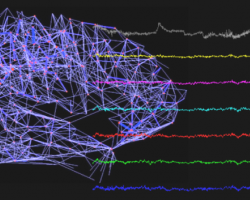Laboratory for Embodied Cognition (Glenberg)

What is Embodied Cognition?
How do words, objects, and events become meaningful to us? Glenberg and his students are attacking these problems by developing an embodied theory of cognition: All cognitive processes are based on bodily and neural processes of perception, action, and emotion. Recent work in the lab has demonstrated a) how language comprehension depends on action and emotion, b) how coordinated action links us to other people, c) contributions of mirror neurons to language and action understanding, d) how embodiment theory can be used to design educational interventions to enhance young children's reading comprehension.
Research in the Glenberg lab is organized into two tracks. The first investigates the embodied basis of cognition with a focus on language. This basic research is guided by the question: How do bodily and neural systems of action, perception, and emotion contribute to high-level cognition? The second track applies the basic research to developing a reading comprehension intervention for emerging readers.The intervention, EMBRACE, is designed to help children construct embodied mental models while reading: Children MANIPULATE IMAGES ON AN IPAD to correspond to the sentences they read, and then they learn to imagine manipulating the IMAGES. This intervention greatly increases reading comprehension and has the collateral benefit of helping children love to read."
Our lab motto is Ago Ergo Cogito - "I act, therefore I think"
Lab Director and Principal Investigator: Art Glenberg, PhD, Professor
The EMBRACE research Team:
At University of South Florida
Laida Restrepo (Professor and Chair)
At University of Pittsburgh
Erin Walker (Associate Professor)
At Ball State University
Ligia Gómez (Assistant professor)
Recent Publications:
Adams, A. M., Glenberg, A. M., & Restrepo, M. A. (2019). Embodied reading in a transparent orthography. Learning and Instruction, 62, 27-36. https://doi.org/10.1016/j.learninstruc.2019.03.003
Lekshmi Narayanan A.B. et al. (2021) Parent-EMBRACE: An Adaptive Dialogic Reading Intervention. In: Roll I., McNamara D., Sosnovsky S., Luckin R., Dimitrova V. (eds) Artificial Intelligence in Education. AIED 2021. Lecture Notes in Computer Science, vol 12749. Springer, Cham. https://doi.org/10.1007/978-3-030-78270-2_43
Wall, D., Foltz, S., Kupfer, A., & Glenberg, A. M. (2021). Embodied action scaffolds dialogic reading. Educational Psychology Review. https://doi.org/10.1007/s10648-021-09617-6
Glenberg, A. M. (2021). Embodiment and learning of abstract concepts (such as algebraic topology and regression to the mean). Psychological Research. https://doi.org/10.1007/s00426-021-01576-5
Yu, C. S. -P., McBeath, M. K., & Glenberg, A. M. (2021). The gleam-glum effect: /i:/ versus /λ/ phonemes generically carry emotional valence. Journal of Experimental Psychology: Learning, Memory, and Cognition, 47(7), 1173–1185. https://doi-org.ezproxy1.lib.asu.edu/10.1037/xlm0001017
Morey, R.D., Kaschak, M.P., Díez-Álamo, A.M. et al. (2021). A pre-registered, multi-lab non-replication of the action-sentence compatibility effect (ACE). Psychonomic Bulletin and Review. https://doi.org/10.3758/s13423-021-01927-8
Fischer, M. H., Glenberg, A. M., Moeller, K., & Shaki, S. (2021). Grounding (fairly) complex numerical knowledge: An educational example. Psychological Research. https://doi.org/10.1007/s00426-021-01577-4
Gómez, L., & Glenberg, A. M. (2022). Embodied Classroom Activities for Vocabulary Acquisition. In S. L. Macrine and J. Fugate (Eds.) Movement Matters: How Embodied Cognition Informs Teaching and Learning. Cambridge, MA: The MIT Press.
Glenberg, A. M. (2022). Reaching the ‘Learning Analytics’ — ‘Embodied Design’ promise of synergy. International Journal of Child-Computer Interaction, 31. https://doi.org/10.1016/j.ijcci.2021.100424.
Sanabria, A. A., Restrepo, M. A., Walker, E., & Glenberg, A. (2022). A reading comprehension intervention for DLLs with weak language reading skills. Journal of Speech, Language, and Hearing Research. https://doi.org/10.1044/2021_JSLHR-21-00266.
Gómez, L., Restrepo, M. A., Glenberg, A. M., & Walker, E. (2023) Enhancing Question-Asking during Shared Reading in Immigrant Latino Families, Journal of Latinos and Education, 22:4, 1389-1406, DOI: 10.1080/15348431.2021.1971084
Körner, A., Castillo, M., Drijvers, L., Fischer, M. H., Günther, F., Marelli, M., Platonova, O., Rinaldi, L., Shaki, S., Trujillo, J. P., Tsaregorodtseva, O., & Glenberg, A. M. (2023). Embodied Processing at Six Linguistic Granularity Levels: A Consensus Paper. Journal of Cognition, 6(1): 60, pp. 1–28. DOI: https://doi.org/10.5334/joc.231
Marji, M., Schwartz, C., Nguyen, T., Kupfer, A. S., Blais, C., Restrepo, M. A., & Glenberg, A. M. (2024). Learning to Listen: Changes in Children’s Brain Activity Following a Listening Comprehension Intervention. Behavioral Sciences, 14(7), 585. https://doi.org/10.3390/bs14070585